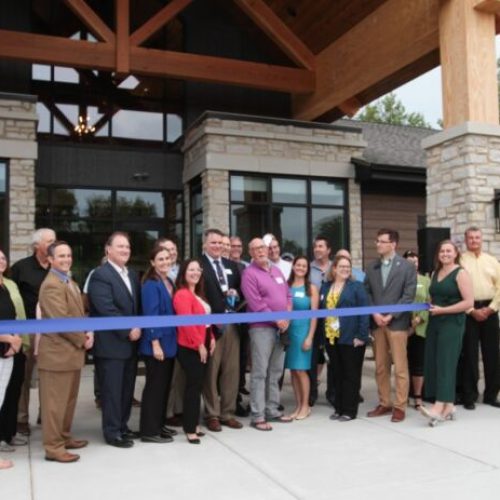Posted on 07/21/21 02:00:pm

Sheboygan mayor, members from dozens of community organizations toured the facilities, participated in ribbon cutting on July 20
SHEBOYGAN, WIS. (July 21, 2021) — Rogers Behavioral Health, one of the nation’s largest not-for-profit mental health treatment providers, celebrated a grand opening on July 20 for its new Sheboygan outpatient clinic and first-ever supportive living facility.
More than 60 members from local community, health, and educational organizations joined Rogers representatives for tours of the 10,000-square-foot clinic located at 1108 S. Wildwood Ave and the adjacent 9,000-square-foot supportive living house.
The event culminated in a ribbon-cutting ceremony featuring Sheboygan Mayor Ryan Sorenson, Rogers clinicians and leadership, and local Rogers advocate Lee Gentine who described Rogers as a place of hope and healing.
“When you’re struggling with mental illness or addiction, it can feel very lonely,” Gentine said. “But they are not things to be suffered through on your own. There are so many people who can and who want to help. I’m so proud that those who are suffering can now get that help right here in our community.”
Mental health and addiction treatment is needed now more than ever in Sheboygan, according to Mayor Sorenson, adding that the number of guests at the grand opening demonstrates the community’s commitment to addressing the issue.
“Rogers is nationally renowned for its specialized mental health and addiction treatment, and we are so blessed to have them here in our community,” Mayor Sorenson said. “Now it’s our job to be cheerleaders spreading the word so that those who need help do get help.”
One in five adults in the U.S. experience mental illness, yet only 30 percent of those people will receive treatment, Sean LeNoue, MD, told guests.
“It’s Rogers’ goal to improve that statistic by spreading access to specialized, evidence-based mental health treatment throughout the country, so that all people, from all backgrounds, get the life-saving treatment that they need and deserve,” said Dr. LeNoue, associate medical director of Rogers’ Regional Division.
Opened on June 28, the Sheboygan outpatient clinic treats OCD, anxiety, depression, other mood disorders, and co-occurring substance use in adults, as well as children and adolescents ages 6 to 17. It can serve up to 12 adolescents and 28 adults at a time.
Located next door, the two-story supportive living house will accommodate up to 12 adult patients at a time and provide them with a place to call home during treatment as they prepare to transition back into everyday life.
The environment supports recovery through shared experience and builds strength and hope with treatment teams who are available for coaching and mentoring. The space will feature a common living room, dining room, kitchen, and shared bedrooms with kitchenettes and bathrooms.
“This space will provide a safe place for people in treatment to spend time focusing on their journey while practicing self-care, hygiene, life, and vocational skills that will help them transition into the next phase of recovery,” said clinical director David Jacobi, PhD.
In addition to Dr. Jacobi and Dr. LeNoue, the Sheboygan clinic staff is comprised of nearly 20 individuals, including therapists, behavioral specialists, registered nurses, and an advanced practice nurse.
To request a free, confidential screening, call 800-767-4411. For more information, visit rogersbh.org/sheboygan.
###
Rogers Behavioral Health is a nationally recognized, not-for-profit provider of mental health and addiction services. Rogers offers evidence-based treatment for adults, children and teens with depression and mood disorders, eating disorders, addiction, OCD and anxiety disorders, trauma and PTSD. In addition to a growing network of regional locations in California, Florida, Georgia, Illinois, Minnesota, Pennsylvania, Tennessee and Washington, Rogers operates three inpatient behavioral health hospitals, 14 residential programs and nine outpatient centers in Wisconsin. The System also includes Rogers Behavioral Health Foundation and Rogers InHealth. Learn more at rogersbh.org.


